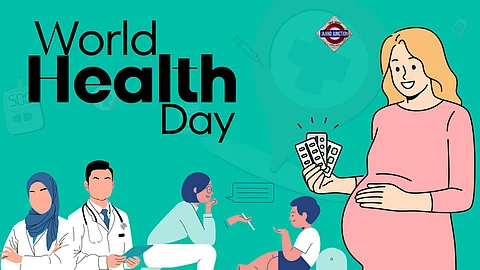

Every April 7, the world unites to celebrate World Health Day – a day dedicated to promoting global health, wellness, and equity. As we approach World Health Day 2025 (विश्व स्वास्थ्य दिवस 2025) with the theme "Healthy Beginnings, Hopeful Futures," we are reminded that the foundations we lay for health today can pave the way for a brighter, more resilient tomorrow. This day not only honors past achievements in public health but also inspires new innovations and policy reforms that will shape our future.
World Health Day was first observed in 1950 by the World Health Organization (WHO) to mark its founding and to raise awareness about pressing global health challenges. Originally, this day served as a platform for educating people about health risks and promoting measures to improve health outcomes worldwide. Over the years, World Health Day has grown from a modest commemoration into a dynamic global campaign that addresses a wide range of health issues.
Throughout its history, World Health Day has seen a variety of themes tailored to contemporary health challenges. Past themes have spotlighted issues such as mental health, diabetes, HIV/AIDS, and environmental health. These themes have not only raised awareness but have also mobilized governments and organizations to take concrete actions toward improving health systems. As we move towards World Health Day 2025, the focus on "Healthy Beginnings, Hopeful Futures" encapsulates the idea that early interventions and preventive care are vital for ensuring long-term health and well-being.
Early Childhood Health: The journey to a healthy life begins at birth. Emphasizing early childhood health means ensuring that every child has access to proper nutrition, vaccinations, and routine medical care. Early interventions can prevent chronic diseases and developmental delays later in life.
Maternal Health: Maternal well-being is equally critical. Programs focusing on prenatal and postnatal care not only improve outcomes for mothers but also set the stage for the long-term health of their children. Investments in maternal health are investments in the future of communities.
Preventive Care: Encouraging regular health check-ups and preventive care can help detect potential health issues before they become severe. This proactive approach reduces the burden on healthcare systems and improves quality of life.
Advancements in Technology: Digital health innovations such as telemedicine, wearable health monitors, and AI-driven diagnostics are revolutionizing healthcare delivery. These technologies make it easier to reach underserved populations and provide high-quality care, regardless of geographical barriers.
Universal Health Coverage: Achieving universal health coverage is a fundamental goal for global health. When everyone has access to essential health services without financial hardship, societies become more resilient and productive. World Health Day 2025 serves as a call for action to bridge gaps in healthcare access.
Innovative Health Policies: Forward-thinking health policies that prioritize sustainability, equity, and innovation are key to building resilient health systems. Collaborative efforts between governments, NGOs, and the private sector can foster environments where healthy futures are not just an aspiration but a reality.
Since 1950, remarkable progress has been made in various aspects of global health. Some key milestones include:
Eradication and Control of Diseases: Smallpox was eradicated in 1980, and significant strides have been made in controlling diseases such as polio, malaria, and tuberculosis. These successes are a testament to international collaboration and sustained public health efforts.
Increased Life Expectancy: Global life expectancy has increased significantly over the past decades due to improved healthcare, nutrition, and living conditions. This progress is one of the many achievements celebrated on World Health Day.
Technological Breakthroughs: The digital revolution has ushered in new tools and technologies that are transforming health care. Innovations in diagnostics, treatment, and patient monitoring are making health services more accessible and efficient.
Despite these successes, significant challenges remain:
Health Inequities: In many parts of the world, disparities in healthcare access and quality continue to affect vulnerable populations. Bridging this gap is a primary goal of World Health Day.
Emerging Health Threats: The COVID-19 pandemic highlighted the fragility of even the most advanced health systems. Emerging threats such as antibiotic resistance, new viral outbreaks, and the health impacts of climate change require constant vigilance and innovation.
Sustainable Health Funding: Ensuring sustainable investment in health infrastructure and services is crucial. The economic impact of health challenges can be mitigated through strategic planning and international cooperation.
World Health Day (विश्व स्वास्थ्य दिवस) is celebrated with a mix of global events and grassroots initiatives. Across continents, communities engage in health fairs, free medical check-ups, public fitness events, and educational seminars. Social media campaigns using hashtags like #WorldHealthDay, #विश्व_स्वास्थ्य_दिवस_2025, and #HealthyBeginningsHopefulFutures help spread awareness and encourage public participation.
These celebrations are not only about acknowledging achievements; they also serve as platforms for dialogue and innovation. Public forums, webinars, and interactive discussions allow experts and citizens alike to share ideas, challenges, and success stories. This collaborative spirit is at the heart of World Health Day and is essential for driving progress in global health.
As World Health Day 2025 approaches, it stands as a reminder that our future depends on the steps we take today. The theme "Healthy Beginnings, Hopeful Futures" is an invitation to invest in early interventions, embrace technological innovations, and work collectively to ensure that no one is left behind in the pursuit of health and well-being.
The lessons learned from decades of global health initiatives underscore the importance of resilience, adaptability, and community. By addressing current challenges and anticipating future needs, we can build health systems that are robust, inclusive, and sustainable.
In a world marked by rapid change and uncertainty, World Health Day serves as a beacon of hope. It reminds us that through collaboration and innovation, we can create a future where health is a universal right and every individual has the opportunity to thrive.
